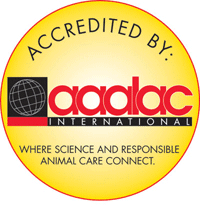Animal research

The VCU Animal Care and Use Program provides assistance to investigators, research staff and students who have received Institutional Animal Care and Use Committee approval to perform research, teaching and testing studies on animal subjects. Overseeing this program campuswide, ACUP ensures humane and appropriate animal care and use by providing for the animals' husbandry and veterinary care, and monitoring their use by all VCU animal users. ACUP maintains accreditation by AAALAC International.
- Animal Welfare Assurance with OLAW: D16-00180 (A3281-01)
- USDA Class R research facility, customer number 493 under certificate number 52-R-0124
- Continuous full accreditation through AAALAC since Aug. 3, 1966
For more details about our program requirements, IACUC protocol submission process, Occupational Health and Safety Program, training requirements, and policies and guidelines, please visit the VCU Animal Care and Use Program webpage (requires VCU eID login):
Policy statement
Public support for animal research comes as a privilege and imparts great responsibility on the part of institutions, researchers and animal caretakers. Virginia Commonwealth University places the ethical treatment of animals as a primary responsibility and the founding principal of our animal care and use program.
While many advances in human medicine, by law, require safety data from animal research, it would be a misconception to think that research involving animals is conducted for the exclusive benefit of humans. In fact, biomedical research involving animals has produced great benefits in both human and veterinary medicine, including treatments for arthritis, asthma, epilepsy, high blood pressure and cancer; surgical techniques to correct shared conditions; and medical devices that improve the length and quality of human and animal lives.
Ethical foundation: VCU employs the following ethical mandates, known as “The Three Rs” of animal research.
- Reduction: Required evidence that the number of animals is reduced to the smallest number possible (respecting the value of each life)
- Replacement: Required evidence that a non-animal model is not available and/or that the species identified is justified (replacing animal use where feasible)
- Refinement: Required evidence that all procedures ensure the highest quality of compassionate care and comfort (applying standards developed to ensure quality of life through the minimization of risk and discomfort, adequacy of housing and advanced veterinary medicine)
While it is possible that a time will come when animal use for research, teaching and testing is not necessary, there currently is no complete alternative to animal research. Therefore, the use of animals for research, testing and teaching remains a conflict of our society as we pursue medical and scientific advances that benefit human and animal health.
Regulatory framework: Public and scientific concern over the humane care and use of animals continues to shape the laws that regulate the humane care and use of animals in research, testing and instruction. These laws have changed and updated over the years as public attitudes and awareness have matured. VCU adheres to several sets of regulations, including (but not limited to):
- Animal welfare act and regulations (United States Department of Agriculture)
- Office of Laboratory Animal Welfare policies and laws
- PHS Policy on Humane Care and Use of Laboratory Animals, 2015 (HTML, PDF)
- Guide for the Care and Use of Laboratory Animals, 8th Edition (HTML, PDF)
- AVMA guidelines on euthanasia
- U.S. government principles
- Public law 99-158, animals in research
- Public law 103-43, plan for use of animals in research, 1993
- International guiding principles for biomedical research involving animals, 2012
- State and local regulations pertaining to access to animals, animal cruelty laws and the regulation of research
Institutional approach: The VCU program supporting the humane care and use of animals includes the Institutional Animal Care and Use Committee together with the Office of Research Subject Protections and the Division of Animal Resources. These groups work in unison to meet or exceed national standards for the care and use of animals, as evaluated by our program’s accrediting body, the Association for Assessment and Accreditation of Laboratory Animal Care International. VCU has been accredited continuously by AAALAC since 1966 and undergoes full inspections of the program every three years. Unannounced program inspections are also conducted by the U.S. Department of Agriculture Animal and Plant Health Inspection Service at least annually.
You are encouraged to explore some of the additional resources noted here and listed below as you develop your own perspective on the care and use of animals in research and education. This issue is one that society, and VCU, will continue to address until adequate alternatives are developed for the replacement of all animal use in research and education. Until that time, VCU continues to apply the highest ethical standards and accept the great responsibility afforded by way of public trust in, and financial support of, our research programs.
P. Srirama Rao, Ph.D.
Vice President for Research and Innovation
Additional resources
- National Institutes of Health News
- Foundation for Biomedical Research
- American Physiological Society - Why Do Scientists Use Animals in Research
- Institute for Laboratory Animal Research
- National Association for Biomedical Research
- National Institutes of Health’s Office of Laboratory Animal Welfare
- U.S. Department of Agriculture’s Animal Welfare Information Center